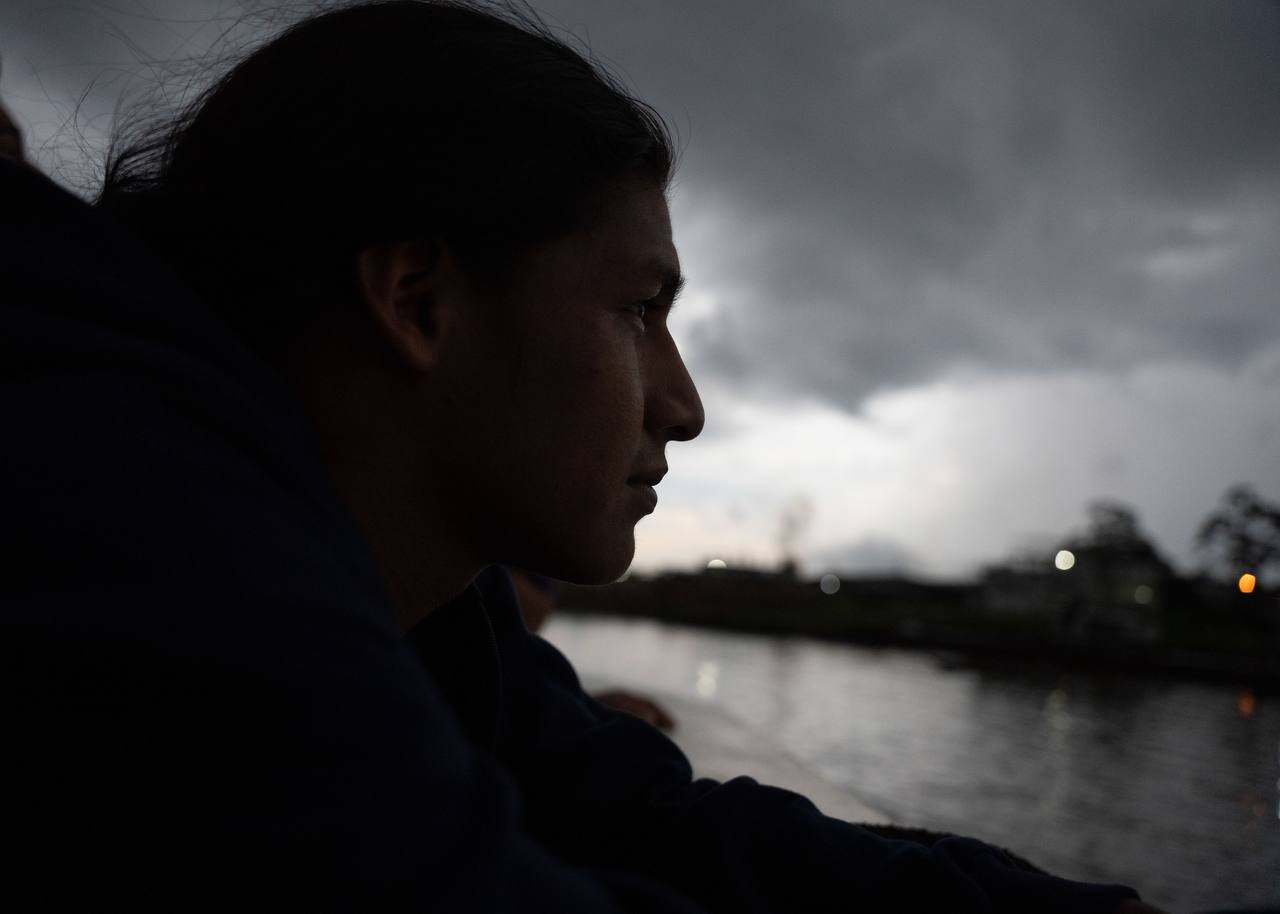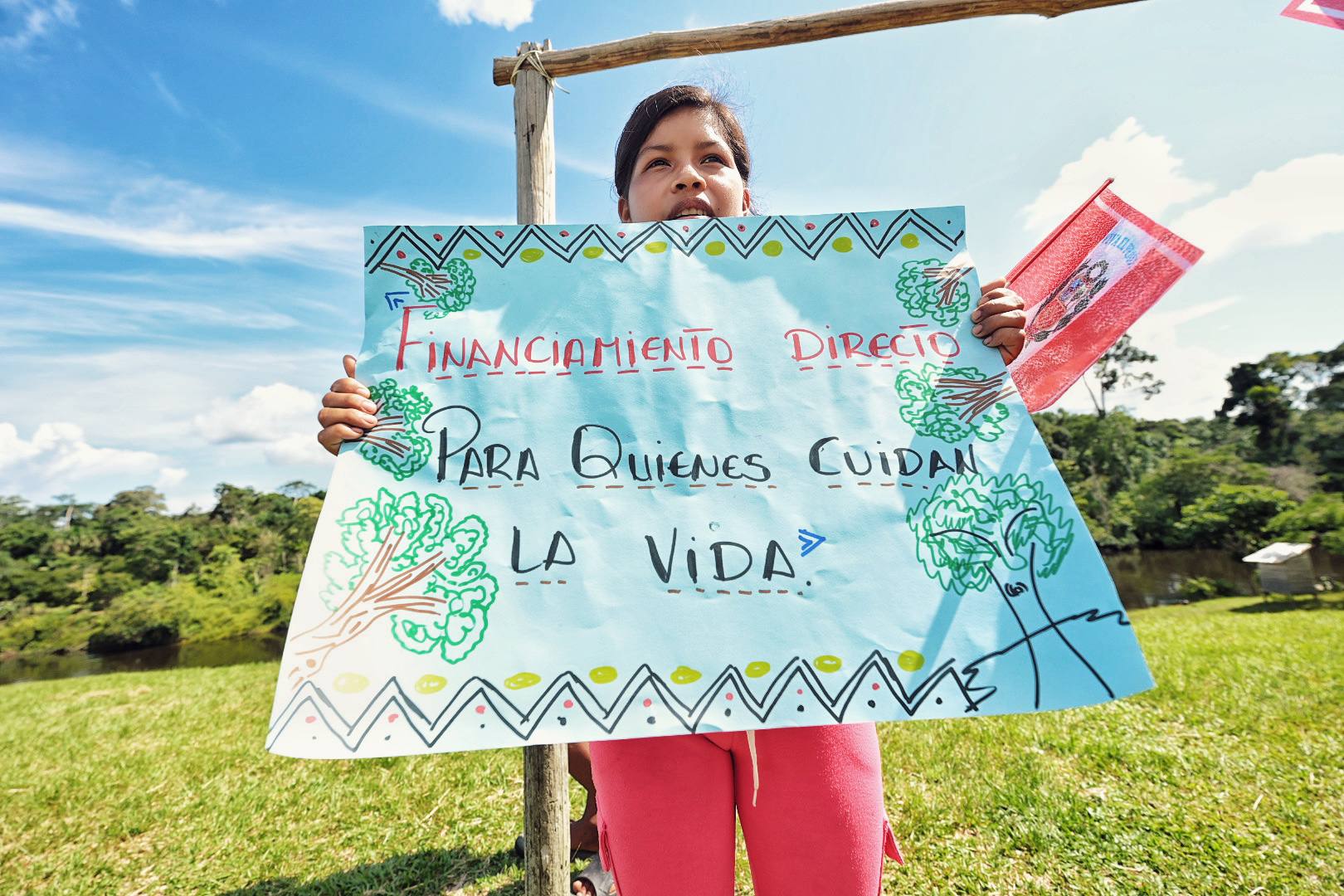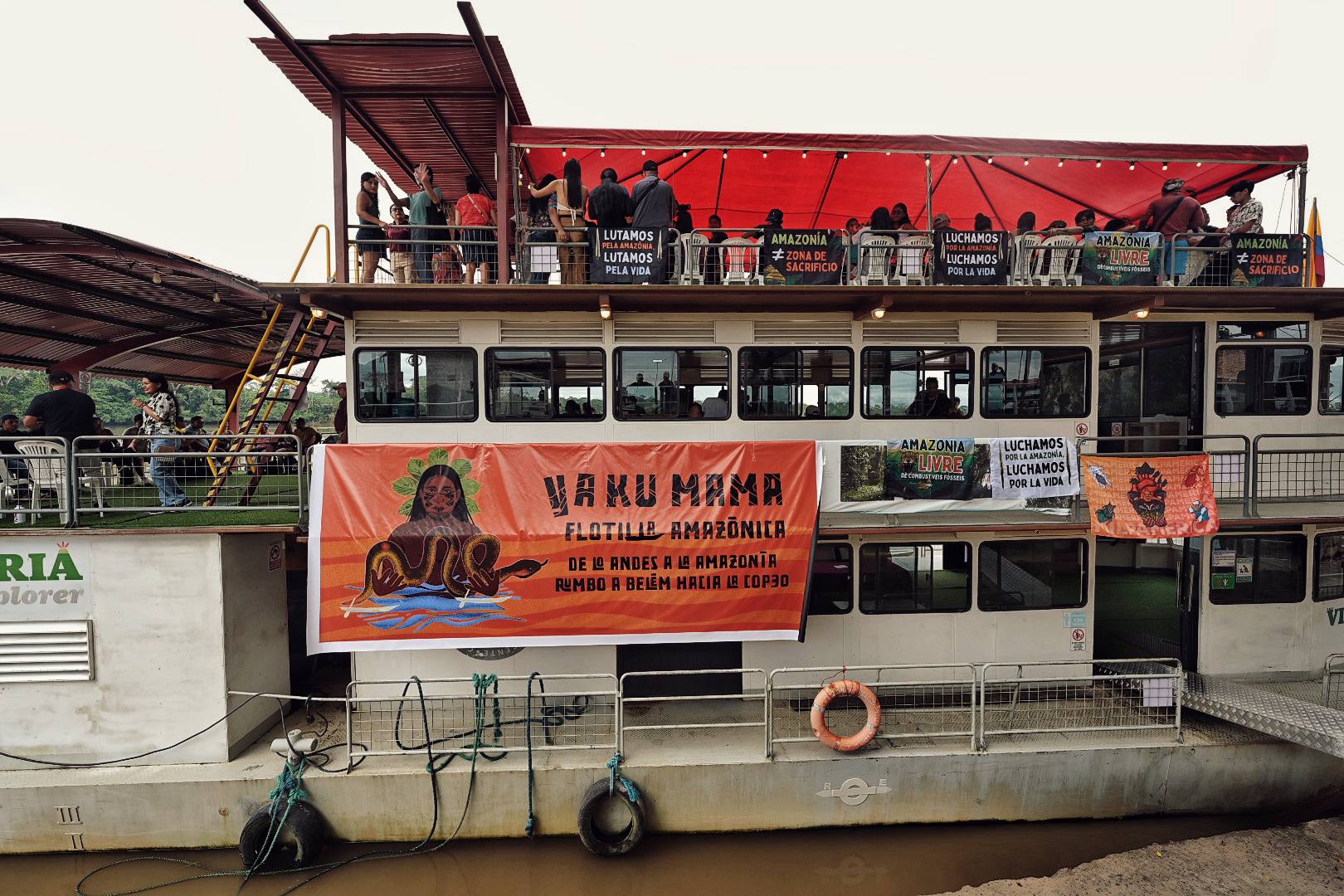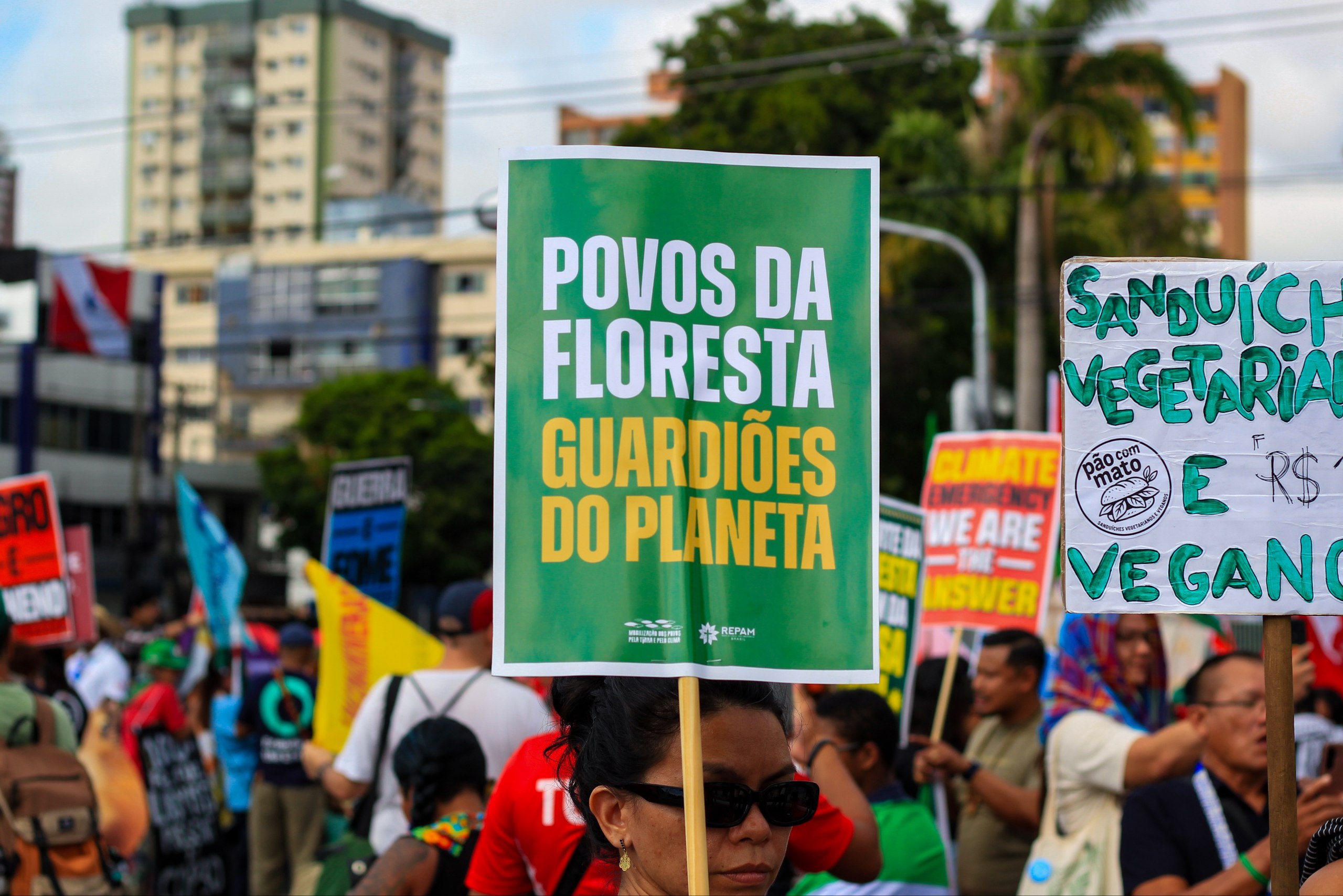
March for climate: at COP30, 70,000 people demand climate justice
During the march, we also explored the histories of struggle of people from various regions of the planet
Catalina Roig, from the NINJA Collaborative Coverage at COP30
According to the organizers of the Global Climate March, more than 70,000 people participated in the action that took to the streets of Belém, Pará, this Saturday (November 15). The Brazilian “hosts” were joined by demonstrators from all regions of the planet. They protested against the inertia of global leaders, denounced setbacks and rights violations, and demanded social and climate justice, as well as real solutions to fight the climate emergency. The route of the major COP30 march ran from the Mercado de São Brás, in the Historic Center, to the Aldeia Cabana.
The diversity of languages, stories of struggles, and causes was striking. The filipino Luke Espíritu, president of the socio-environmental organization Solidarity of Filipino Workers, represented the working class. “We are fighting against the climate crisis and reminding that workers must use their class power to pressure their governments to stop using fossil fuels.” He added, “I come from one of the countries most vulnerable to climate catastrophes: before coming here, we suffered two successive mega-storms that killed thousands, and hundreds of people are still missing today. That is why we are here, to fight for a post-carbon society and economy that is for everyone.”
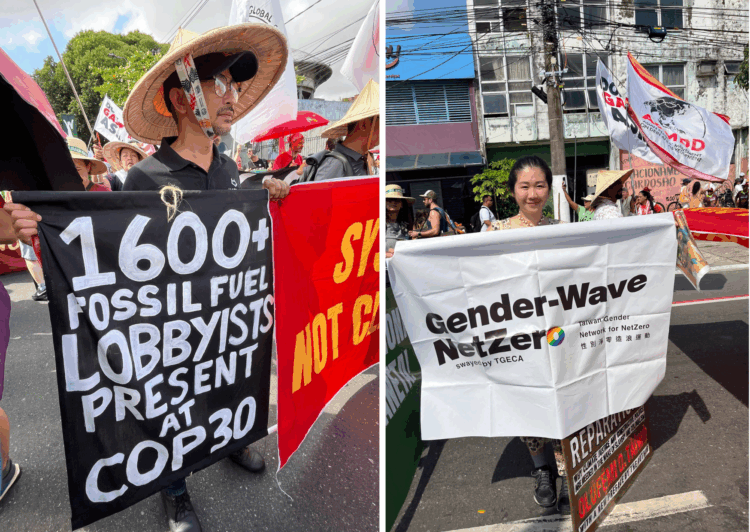
Also representing the Asian continent, Sandra Tai, director of the Taiwan Green Energy for Charity Association, stated that “climate justice cannot leave anyone behind, regardless of their gender, race, or class—it must combine the climatic with the social.” Taiwan faced two typhoons this year, affecting thousands of people, especially Indigenous populations living in more flood-prone areas.
Tamika Sadler, from the Gubbi Gubbi people of Australia, also participated in the march. “We are marching in solidarity with the Indigenous peoples of the Amazon so that their voices are heard at this COP30.” Since her country is vying with Turkey to host COP31, she said it is “important to show that COP30 was an Indigenous COP.” She added, “if Australia hosts COP31, we want to ensure that it is also an Indigenous COP. We want to continue the legacy of the Amazon.”
From Italy, Francesco is part of an artistic movement called Bookbloc, which uses different book covers as shields during marches to protect against potential police repression. In this march, they used titles about climate justice, the rights of Indigenous and Afro-descendant peoples, and international solidarity. “This climate crisis is also related to the political and social model in which we live. Culture, therefore, functions as an element of social and pedagogical transformation to help overcome the current models,” he expressed.
Latin Americans in Belém
Latin American activists were present in large numbers, many of them from the Pan-Amazon region, which comprises nine countries that share the biome: Brazil, Peru, Colombia, Venezuela, Ecuador, Bolivia, Guyana, Suriname, and French Guiana.
Toshao (Chief) Alma Marshall from Guyana, for instance, represented the Kamarang community. She is also part of the Amerindian Peoples Association (APA). “I am here to support all Indigenous people of the Amazon so that our voices are heard and that the plans they make include us.” She explained that Guyana faces many problems, mainly due to unpredictable weather patterns.
Also from the Amazonian region, but Ecuadorian, demonstrator Juan Manuel Crespo affirmed: “We came to support the global march for the defense of the planet, the defense of the Amazon and its Indigenous peoples, and to find this level of social mobilization for a global ecological cause seems historic to me. I believe all this strength can change the history of the world.” Crespo, co-founder of the Kara Solar Foundation, which supports the energy sovereignty of Amazonian communities to free them from fossil fuel dependence, added, “In Ecuador, and in the Amazon in general, oil and gas are the main activities on which people live, so changing the energy matrix becomes a priority to change the model.”
Alejandra Parra, from Chile, shared that the Mapuche people in the Wallmapu territory face “the expansion of capitalism, the expansion of energy, which is not replacing the use of oil or coal, but is expanding energy production for the Global North.” She also added that in her country there are “solar power plants, wind farms, and, further South, green hydrogen, for which enormous megaprojects are being planned that will only deepen the environmental crisis.”
Parra, who is part of the Environmental Rights Action Network (RADA) and the Global Alliance for Incinerator Alternatives (GAIA), stated that she joined the protest “of all the peoples of the world seeking sovereignty.” Furthermore, she was there to denounce false solutions and reinforce the importance of ancestral knowledge. “We need real solutions that come from the people, such as energy sovereignty, food sovereignty, zero waste, and many other solutions that come from the peoples and the territories.”
On the other side of the mountain range, Mijael Kaufman, co-founder of the organization Consciente Coletivo and the elected Public Representative for the Escazú Agreement, said he was not surprised that the regional spirit of taking to the streets was so present at this COP, unlike other editions. “I am concerned about the financing for the Global South, specifically the non-policies that are currently happening in the region, especially in Argentina.”
Among the demonstrators was also Xananine Ramírez, who traveled for about a month to be in Belém. The young Indigenous leader of the Ngiwa people from Mexico highlighted the importance of learning about struggles, just as she has gained experience in different territories in Central America, Colombia, and Brazil. At COP30, she is part of the Mesoamerican Caravan for Climate and Life. “It is important to know the experiences and struggles, the organizational experiences that serve to defend life, and it is important that they come to these spaces and are heard to denounce how these international climate negotiation processes are generating false solutions to the crisis and continue to reproduce colonialism, capitalism, and the exploitation of our peoples and territories,” the young woman recounted.
International Solidarity Networks
The freedom of Palestine was also a topic present in the march, where thousands of Palestinian flags were waved. The genocide of the Palestinian people also generates the ecocide of the Gaza territory. Beatriz Carneiro André, an activist for the Palestinian cause, explained that “just as the United States now funds Israel for genocide, in the 70s they funded oil exploration in the Amazon, in addition to the military dictatorship: that is why it is important to talk about Palestine in the march, because we are siblings in struggle and we want a better planet, a free planet.”
Finally, Chayenne Furtado shared her experience receiving the world into her home. “It is very important. As I am a native of a riverside community, I believe we gain strength with the support of all these activists for the climate cause, which is a cause for everyone.” Furtado is an activist for Latinas pelo Clima (Latinas for Climate), an international network of young feminist women for intersectional climate justice in Latin America and the Caribbean. The organization argues that women are at the forefront of environmental protection. “It is we who sow the land and care for the people, and this place of care should not silence us, but place us in the struggle and in a position of protagonism.”

